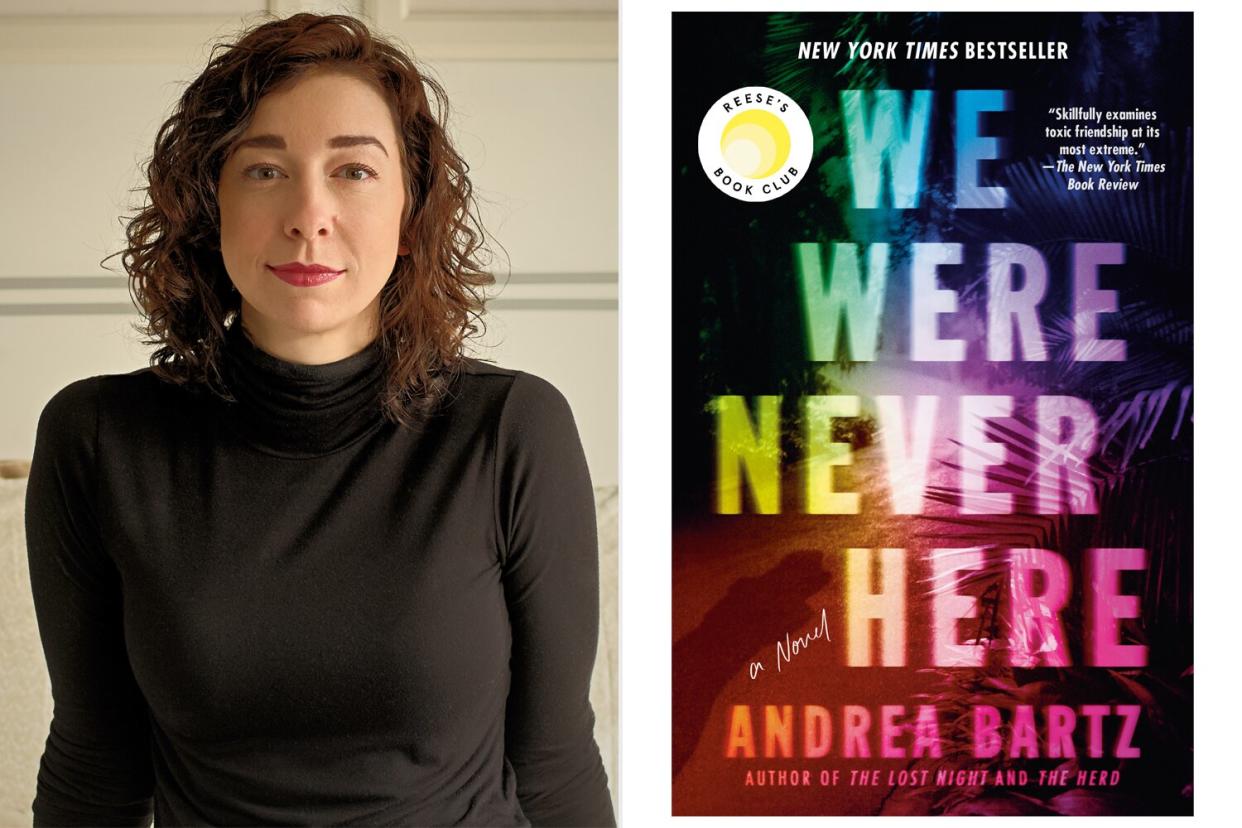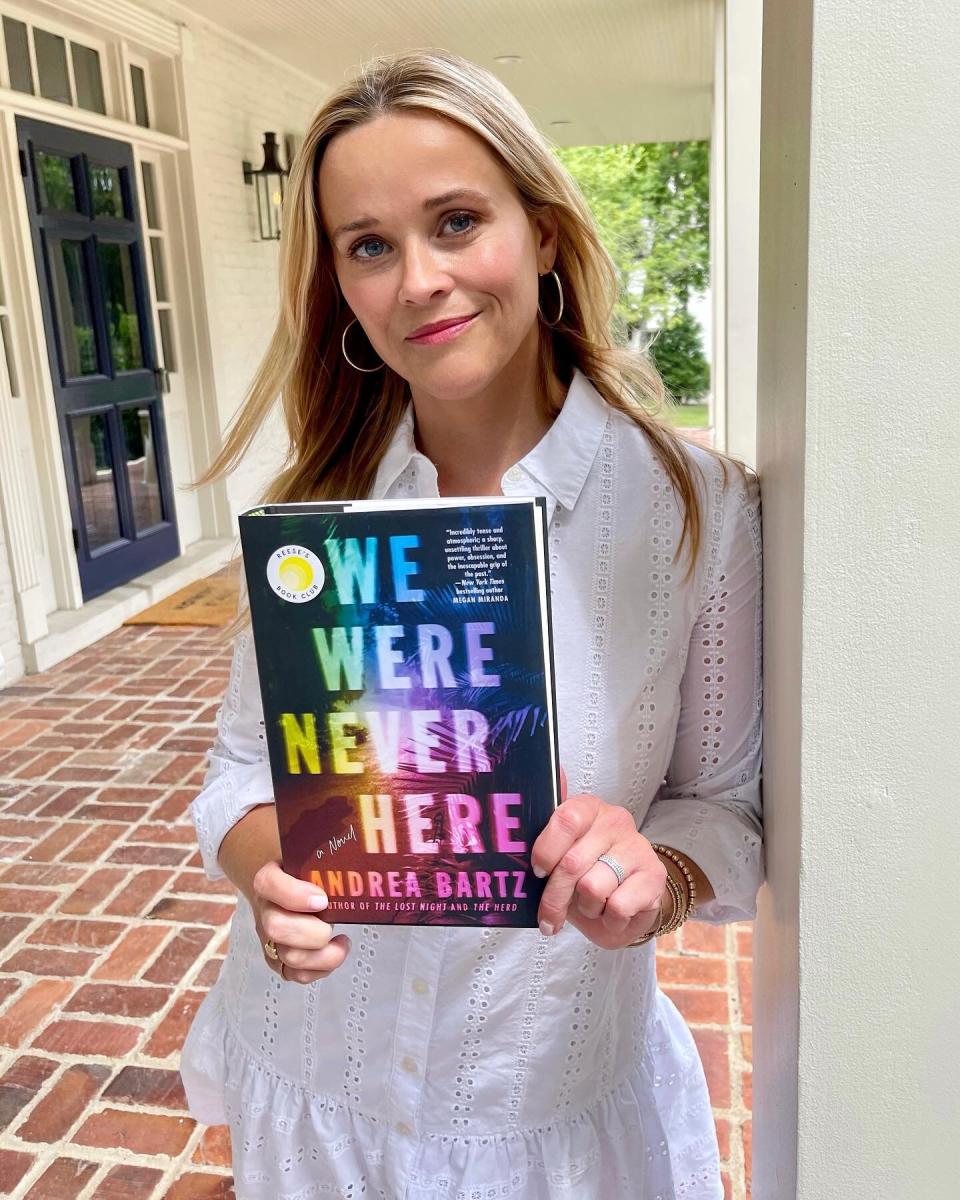We Were Never Here Author on Movie Adaptation and Real-Life Trip That Inspired Deadly Thriller

- Oops!Something went wrong.Please try again later.
Bill Wadman; Penguin Random House
Andrea Bartz doesn't want readers to be afraid of traveling — even if her latest thriller is all about vacations that end in violence.
In We Were Never Here, now available in paperback, author Bartz flips the script on the so-called "violence against women" trope, making her globe-trotting female characters the perpetrators: When best friends Emily and Kristen reconnect for a trip to Chile, it ends with the pair burying a body. Since this isn't their first getaway overshadowed by a covered-up murder, Emily begins to doubt Kristen's claim of self-defense.
"As a travel writer, I noticed how when I talked about what I did, a lot of people said things like, 'I wouldn't want to travel to those places on my own,' or 'I wouldn't want my wife or daughter traveling there.' There was this constant handwringing around women traveling the world, as if by doing so they're inviting danger and violence," Bartz, 36, tells PEOPLE.
"That ticked me off for a lot of reasons, not least of which is that if we tell women, if we discourage women from having those really life-changing experiences in travel, then we're telling them to stay at home and sort of encouraging them to keep their lives small."
We Were Never Here was the August 2021 pick for Reese Witherspoon's book club (the actress called it "every suspense-lovers dream"). Now it's on track to become a Netflix movie with Molly Sims producing under her Something Happy Productions company. (Sims previously told PEOPLE when she read the book she immediately thought, "This movie has to be made.") You executive producers Greg Berlanti and Sarah Schechter are also behind the adaptation along with Mike McGrath, and a screenwriter, Emily Siegel, is now on board.
The concept for her bestseller was inspired by a real-life 10-day trip to Chile Bartz took with her friend Jen back in 2019. While it didn't also include a hastily hidden corpse like the book's turn of events, the pair did befriend a male tourist traveling solo.
"We were just instantly inseparable," she recalls. "He was not creepy and just so clearly respectful and cool and kind that we immediately all had a running joke about how trusting Jen and I were around him; how he was just biding his time until he could steal our money and run off with it. We just kept making jokes about that throughout the weekend."
RELATED: Gone Girl 10 Years Later — Author Gillian Flynn Says She'd Be 'Surprised If I Didn't' Write a Sequel
Never miss a story — sign up for PEOPLE's free daily newsletter to stay up-to-date on the best of what PEOPLE has to offer, from juicy celebrity news to compelling human interest stories.
"On our last day all together, we were hanging out and drinking wine. Somebody made a joke about him running out of time. 'This is your chance!' Then I said to him, 'You've known us exactly as long as we've known you and you actually didn't watch me pour your wine in the kitchen,' " Bartz says. " 'What makes you so convinced we're not a threat to you?' "
She continues, "There was this long silence and then he and his Australian accent was sort of like, 'I guess I don't know that.' It really stuck in my mind that even I — who literally makes a living thinking about violence, women being violent, women being angry, women having these huge emotional reactions — even I did not think for a second that he should be worried about us. It was obvious to everyone that if there was going to be any violence that we, the two women, were the ones who should be worried."
Bartz says it was "fun to write" the novel from there and "explore that theme of violence against women," especially the angle of why "we call it 'violence against women' instead of 'male violence.' Just this constant, comfortable, default, unquestioned assumption that women are going to take and take and take violence in all its forms and harassment and a lack of safety without ever dishing it back."

Reese Witherspoon/Instagram Reese Witherspoon
This is the third book for Bartz, whose debut novel The Lost Night was released in 2019, followed a year later by The Herd. She says she's not "precious" when it comes to her work being adapted: "I created the book and that was my art, and now these people who have an expertise in making movies are going to go do their arts."
"I'm very excited to see how they change things and take it in new directions on the screen," she shares. "My impression is that they're generally going to do a fairly faithful adaptation, but would I be upset if they totally came up with a new ending that also really stuck the landing and did something interesting and surprising that felt true to the themes of the book and to the characters? I would be thrilled with that."
While We Were Never Here followed characters in exotic locations around the world, her next book The Spare Room (scheduled for release next June) features a much more contained, claustrophobic setting. But the dark themes and mystery, of course, remain.
Bartz sets the stage for her follow-up: "It's about a woman whose entire life explodes early in a pandemic. Just before the pandemic, she quit her job to move to a new city with her fiancé. Then, once they're there and on lockdown, he calls off the wedding. She's got nothing. And the only good thing in her life is that she rekindled a friendship with somebody she went to high school with, whose life seems incredibly glamorous and exciting."
The friend from the protagonist's past, a romance writer living in a mansion with her husband, invites the main character to come stay and quarantine with them. "Once there," says Bartz, "she becomes heavily involved with this couple and gets sucked into their secrets, lies and betrayals. It goes really deep into those complicated relationships between women, which I love writing about, but this time there's also a lot of complex romantic entanglements and a sort of love triangle."
"I hope people love it, because I'm very excited about it," she says.

